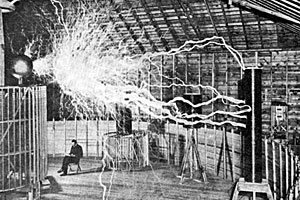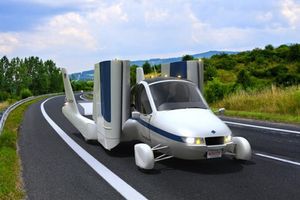Gregg Easterbrook isn’t a fan of flying cars — at least, not flying cars that are fuelled on pure government subsidy:
 General Motors has emerged from bankruptcy and taken initial steps to repay its federal bailout money — two good bits of news, although the taxpayer remains on the hook for many billions of dollars extended to GM. Specialty electric-car maker Tesla Motors also had a successful initial public offering and is being celebrated as some kind of testament to the entrepreneurial spirit. For Tesla, this is pure PR.
General Motors has emerged from bankruptcy and taken initial steps to repay its federal bailout money — two good bits of news, although the taxpayer remains on the hook for many billions of dollars extended to GM. Specialty electric-car maker Tesla Motors also had a successful initial public offering and is being celebrated as some kind of testament to the entrepreneurial spirit. For Tesla, this is pure PR.
Tesla is capitalized via a $465 million no-collateral federal loan. This means that if Tesla goes out of business, the taxpayer will take the loss, while if Tesla becomes a hit, its management and private investors will keep all the profit. The company bought a factory in Fremont, Calif. The Department of Labor made $19 million in special payments to workers there, federal taxpayers subsidizing the Tesla labor force. The firm’s electric cars entitle buyers to a $7,500 tax credit, plus sales tax exemption in many states, meaning Tesla marketing receives significant subsidies — average people are taxed so wealthy Tesla buyers receive extra discounts. Compared to its size, Tesla is more heavily subsidized than General Motors at the low point. Basically, the company’s existence is a giant raised middle finger to the taxpayer.
And what’s the product? A $109,000 luxury sports car that accelerates from zero to 60 mph in 3.9 seconds, the speed of the hottest Porsches. Such speed has no relevance to everyday driving; rather, it is useful solely for road-rage behavior such as running red lights and cutting others off. Taxes forcibly removed from the pockets of average people now fund a rich person’s plaything. I dread the moment President Barack Obama has his picture taken next to a Tesla, as if throwing the public’s money away on this toy for the Silicon Valley rich were an accomplishment.
 The other absurd vehicle in development is the Terrafugia flying car, which just won exemption from a federal airworthiness safety standard. Surely you will feel secure when a flying car exempted from safety standards buzzes your neighborhood, especially when you learn that another federal waiver means the pilot needs only 20 hours of experience before he or she takes off. Maryland, my state, requires 60 hours behind the wheel before receiving a driver’s license. But fly after 20 hours? Hey, wheels up! Surely few of these accidents-looking-for-a-place-to-happen will sell on the free market. So — scan the horizon for a bailout. The Terrafugia company just got a piece of a $65 million military contract to research a flying Jeep-like thing; don’t hold your breath. If patriotism is the last refuge of scoundrels, defense contracting is the last refuge of bad business plans.
The other absurd vehicle in development is the Terrafugia flying car, which just won exemption from a federal airworthiness safety standard. Surely you will feel secure when a flying car exempted from safety standards buzzes your neighborhood, especially when you learn that another federal waiver means the pilot needs only 20 hours of experience before he or she takes off. Maryland, my state, requires 60 hours behind the wheel before receiving a driver’s license. But fly after 20 hours? Hey, wheels up! Surely few of these accidents-looking-for-a-place-to-happen will sell on the free market. So — scan the horizon for a bailout. The Terrafugia company just got a piece of a $65 million military contract to research a flying Jeep-like thing; don’t hold your breath. If patriotism is the last refuge of scoundrels, defense contracting is the last refuge of bad business plans.
Tesla note: The car is well-named, for although Nikola Tesla was an important inventor and a key figure in the development of commercial-scale alternating current (he had one of the basic ideas for getting electricity to homes), he also was a relentless self-promoter, not shy about exaggeration. The famous photo of him in his Colorado Springs laboratory, reading a book as electricity crackles around him, is a double exposure — that is, faked. Tesla’s plan to allow global wireless communication using Earth’s magnetic field was, let’s just say, a long shot — he worked, of course, before satellite-relayed signals were possible — and his claim to be able to deliver electricity to businesses through the air never made much sense. If Tesla were alive today, he’d drive a Tesla.
Terrafugia was last heard from lowering their expected capacity, while raising their prices back in September.

 A Virginia motorist has apparently had to return their vanity license plate after the Department of Motor Vehicles decided it was too lewd for public roadways.
A Virginia motorist has apparently had to return their vanity license plate after the Department of Motor Vehicles decided it was too lewd for public roadways. General Motors has emerged from bankruptcy and taken initial steps to repay its federal bailout money — two good bits of news, although the taxpayer remains on the hook for many billions of dollars extended to GM. Specialty electric-car maker Tesla Motors also had a successful initial public offering and is being celebrated as some kind of testament to the entrepreneurial spirit. For Tesla, this is pure PR.
General Motors has emerged from bankruptcy and taken initial steps to repay its federal bailout money — two good bits of news, although the taxpayer remains on the hook for many billions of dollars extended to GM. Specialty electric-car maker Tesla Motors also had a successful initial public offering and is being celebrated as some kind of testament to the entrepreneurial spirit. For Tesla, this is pure PR. The other absurd vehicle in development is the Terrafugia flying car, which just won exemption from a federal airworthiness safety standard. Surely you will feel secure when a flying car exempted from safety standards buzzes your neighborhood, especially when you learn that another federal waiver means the pilot needs only 20 hours of experience before he or she takes off. Maryland, my state, requires 60 hours behind the wheel before receiving a driver’s license. But fly after 20 hours? Hey, wheels up! Surely few of these accidents-looking-for-a-place-to-happen will sell on the free market. So — scan the horizon for a bailout. The Terrafugia company just got a piece of a $65 million military contract to research a flying Jeep-like thing; don’t hold your breath. If patriotism is the last refuge of scoundrels, defense contracting is the last refuge of bad business plans.
The other absurd vehicle in development is the Terrafugia flying car, which just won exemption from a federal airworthiness safety standard. Surely you will feel secure when a flying car exempted from safety standards buzzes your neighborhood, especially when you learn that another federal waiver means the pilot needs only 20 hours of experience before he or she takes off. Maryland, my state, requires 60 hours behind the wheel before receiving a driver’s license. But fly after 20 hours? Hey, wheels up! Surely few of these accidents-looking-for-a-place-to-happen will sell on the free market. So — scan the horizon for a bailout. The Terrafugia company just got a piece of a $65 million military contract to research a flying Jeep-like thing; don’t hold your breath. If patriotism is the last refuge of scoundrels, defense contracting is the last refuge of bad business plans.


